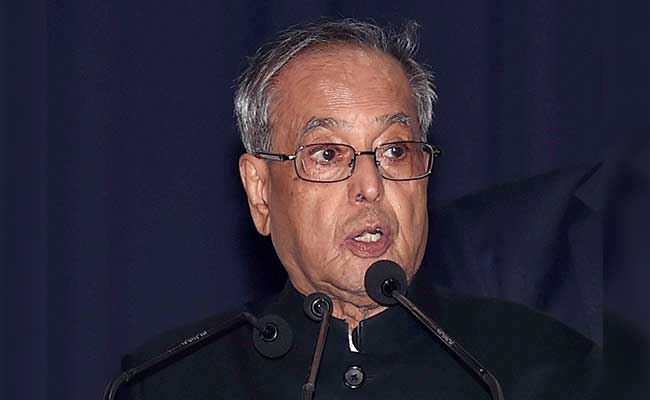New Delhi: President Pranab Mukherjee here today said India is “substantially free” from the globally witnessed menace of homegrown terrorism as citizens possess “ethnicity in mind and have faith in pluralism”.
Mukherjee, while teaching students in the school inside the President’s Estate as part of the second edition of his ‘Pranab Sir’s class’, also spoke about the worrisome development of “political assassinations” in India and its neighbourhood adding that despite these instances “we have had a stable political regime”.
The special session was held to observe ‘Teachers Day’ with students of Class XI of the Delhi government-run Dr Rajendra Prasad Sarvodaya Vidyalaya during which Mukherjee said “secularism is part of the life” for Indians.
India has suffered the brunt of terrorism, including that of the cross-border variety, he said.
The President said it was the credit and success of India’s policy and acumen of the administration that incidents of homegrown terrorism, the biggest menace to international peace and community, has kept India “substantially free” from its tentacles.
“It is we who are attacked and we are the victims of cross-border attacks… But not so much of homegrown terror,” he said, adding this was because of the “ethinicity of mind, belief and faith in pluralism, huge diversity in language, religion, food… Almost in everything.”
We all belong to the same system, the President said, adding that this quality was “unique”.
Talking for about 50 minutes to the students on the subject of ‘Politics in India since Independence’, he recounted the evolution of the democratic process in India post Independence, the building up of the electoral process and participation of Indians in the constitutional democracy.
The President, who has worked as a teacher before he took the political plunge, also taught the students about the formation of political parties including the creation of the BJP from Jansangh and the advent of coalition politics in the country.
He remembered the “formation” of states by the State Reorganisation of Commission as an “important development” in India’s history.
Mukherjee called the partition of the country as a “psychological trauma” for the people who were extricated from their homes adding creation of communal tension was an aftermath of this but our political leaders and statesmen controlled these issues.
He went on to praise the strength of the Indian economy
saying it was steady despite eight years of international slowing down of ecomony as he hoped that the country’s economy would grow not less than 7.5 per cent in the days to come.
The students also asked some questions to ‘Pranab Sir’ including if it would be good to hold all elections in the country in one go.
The President said India has “proved the mettle” in successfully implementing political democracy and the Election Commission can “put its mind” in changing the Code of Conduct so that it does not disturb the polls, adding “all participants of the political spectrum” can brainstrom how to tackle this issue.
On being asked what should the country do to improve the economy and its medal tally in the Olympics, the President said India’s requirement is to have “growth with equity” and also overall creation of better physical, educational and health infrastructure which are the requirements of a healthy society.
Later, while making a speech to mark the event, the President said the need of the hour was to have “inspired teachers” who can keep the trait of curiosity and that of asking questions alive in children.
“We have to build up scientific temper… We must also inculcate in the minds of teachers the spirit of innovation,” he said.
The President also expressed his worry over a recent news item that many school children in Delhi were not able to read their textbooks and sought corrective measures.
During the event, Manish Sisodia, Delhi’s Education Minister said his government was working to enhance the confidence of people in government schools so that they can send their children to study in these institutions.
(Reopens DEL35)
Speaking on the occasion, the President said in ancient days, the parting advice of gurus to students was that they should be truthful, virtuous and not deviate from their conviction.
He said as the Visitor to institutions of higher learning, he had always stressed on the need for inspired teachers in the country.
If 74 per cent government schools students in class IX cannot read their textbooks and if about 46 per cent of the children from class VI to IX cannot read even textbooks of class II, the situation is “grave”.
“A spirit of innovation should be encouraged in the minds of students. Viable and sustainable bridges should be built between formal and informal knowledge systems. The marvel of our system is our commitment to pluralism. All Indians are united by a common thread despite diversities such as religion, language etc,” Mukherjee added.
PTI

